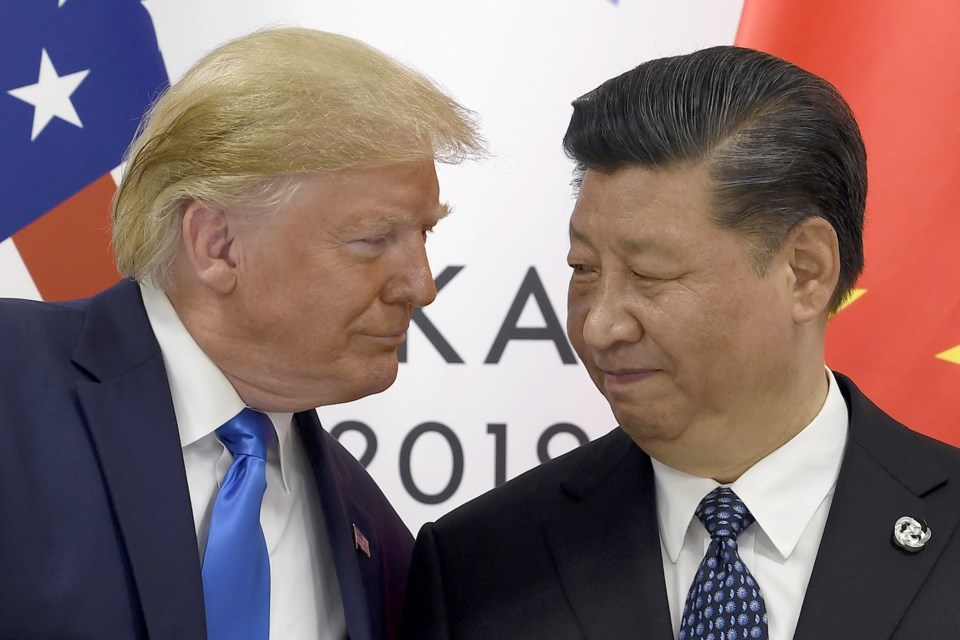TAIPEI, Taiwan (AP) ā The first time China faced Donald Trump in the White House, there was a trade war, a breach of protocol involving Taiwanās former leader, and a president-to-president bromance that turned sour.
As prepares , China is bracing for unpredictability in its ties with the United States and renewed tensions over trade, technology and Taiwan.
A new tariff war looms
Perhaps the biggest consequence for China ā if Trump stays true to his campaign promises ā is his on all Chinese exports to the U.S.
Tariffs like that would be a blow to Chinaās already unstable economy, which is suffering from high youth unemployment, a lengthy property slump and government debt. A 60% duty on Chinese imports could shave off 2.5 percentage points, or about half, of Chinaās projected economic growth, according to an analysis published earlier this year by UBS.
During Trump's previous term in office, the U.S. imposed tariffs on more than $360 billion of Chinese products. That brought Beijing to the negotiating table, and in 2020 the two sides in which China committed to improve intellectual property rights and buy an extra $200 billion of American goods. A research group a couple of years later showed China of the goods it had promised.
President Joe Biden retained most of those tariffs and added fresh duties this year on imports including steel, solar cells and electric vehicles.
Like last time, tariffs could serve as a tool to force Beijing back to the negotiating table, said Henry Gao, a law professor at Singapore Management University who focuses on international trade.
āGiven the weak economic position of China this time, I think there will be more willingness to talk,ā he said. āThus, while the tariff might have some short-term effects on the Chinese economy, the situation might improve once they reach a deal.ā
Factoring into the trade talks could be Trumpās appeals to Chinese President Xi Jinping to help negotiate a resolution to the Ukraine war, which Trump without saying how.
Trump previously sought Xi's help in dealing with North Korea's rogue leader Kim Jong Un. That dynamic could repeat itself, with Trump weighing trade grievances against seeking China's support in global crises, according to Wang Huiyao, founder of the Beijing-based think tank Center for China and Globalization.
āChina is the largest trading partner of both Russia and Ukraine," Wang wrote in a recent commentary. "These close economic ties give China a unique opportunity to play a greater role in peace-making efforts.ā
Willing to go ācrazyā over Taiwan
There is one scenario in which Trump has threatened to impose even higher tariffs ā 150% to 200% ā on Chinese goods: if China invades Taiwan, a self-ruled democracy that Beijing claims as its own.
The U.S. does not recognize Taiwan as a country, but is its strongest backer and biggest arms provider.
Trump angered Beijing in December 2016 by taking a congratulatory call from Taiwanās then-president Tsai Ing-wen in a . No U.S. president had spoken directly to a Taiwanese leader since Washington and Beijing established ties in 1979.
Trump's move created anxiety in China-watching circles, but ultimately, he stuck to supporting the status quo in relations between Taipei and Beijing.
China expects him to continue to do so, said Zhu Feng, dean of the School of International Relations at Nanjing University.
āWill (he) want to turn to support Taiwan independence? It is unlikely,ā he said.
As for Chinaās repeated threats to annex Taiwan, Trump told The Wall Street Journal last month that he would not have to use military force to prevent a blockade of Taiwan because Xi ārespects me and he knows Iām (expletive) crazy.ā
On the campaign trail, Trump sometimes talked up his personal connection with Xi, which started exuberantly during his first term but soured over disputes about trade and the origins of the COVID-19 pandemic.
But Trump has also said that , likening the relationship to insurance. Taiwan spends about 2.5% of its GDP on defense, and this year.
Trump has purposely maintained a sense of uncertainty in his relationship with China, said Da Wei, director of the Center for International Security and Strategy at Tsinghua University in Beijing.
āWe are clear about the challenges,ā he said. āAs for opportunities, we are yet to see them clearly.ā
Disputes over chips
During his first term, Trump began targeting Chinese technology firms over security concerns, focusing on large companies like the telecoms giant Huawei. Biden continued in that direction by placing , which are needed to develop strategic industries such as artificial intelligence.
But Trump has criticized Bidenās CHIPS and Science Act, a bipartisan bill that earmarked $53 billion to build up domestic manufacturing of semiconductors. Currently, Taiwan produces nearly 90% of the worldās supply of the most advanced chips.
The islandās largest semiconductor manufacturer, TSMC, , partly to respond to the CHIPS Act, and to be prepared to withstand any other protectionist policies in the U.S., said Shihoko Goto, director of the Indo-Pacific Program at the Wilson Center.
Trump has promised to do away with the CHIPS Act, though critics say that would undermine his campaign to reindustrialize the U.S. The president-elect has also accused Taiwan of āstealingā the chip industry from the U.S. decades ago.
āRather than providing a silicon shield, Taiwanās dominance in the chip industry could actually be the source of tension between Taipei and Trump, as Taiwanās successes in the chip sector may be seen as having only been possible as a result of the United States being taken advantage of,ā Goto said.
Simina Mistreanu, The Associated Press



